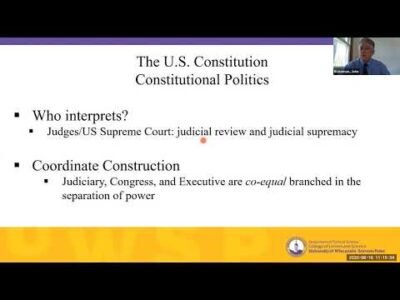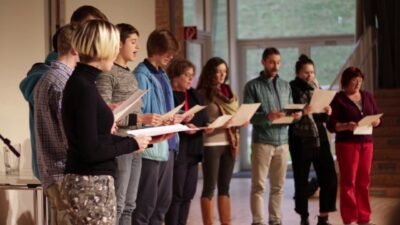Foreign [Music] to you this is all things Apostolic I’m Dr Nathaniel Wilson I’m glad to be with you and I have with me again our good friend and Scholar Pastor Jeremy Wilbanks from Cullman Alabama welcome Pastor Will Banks good to be here thanks for letting me come back yes sir we are continuing
A discussion that we are having uh from time to time here you have to if you’re going to go through the archives you’ll have to go back and find where we are talking on this subject uh so
Far I think we’ve done some of it at least every week this is going to be today a discussion that we’re going to have again about how the Bible’s written and and when you read it what are you
Really reading in terms of the kind of reading there are different kinds of literature and so the Bible has all kinds of literature but what is the predominant scope of it so we talked about this
A little bit before and then uh when we finish this on Monday we’re going to break new ground so we’re excited about that um anyway so when you read the Bible when we uh where we stopped on
This was that the primary uh uh method of Bible writing is narrative yes it’s it’s it’s story and um uh Pastor Wilbanks talked about that and explained a little bit about that to us and when we talk about narrative we know that in the Bible there are portions of it that are not
Narrative there’s all kinds of literary devices used in the Bible but narrative is the underlying a way that we read our Bible and that causes us to have to interpret it because narrative has to be interpreted and so every reader is also an interpreter so when we talk about this
Uh Pastor Wilbanks we we immediately run into well there’s big sections of the Bible that are not narrative like the Epistles and the Psalms and so forth maybe you can address that for us yeah all all the the as you said the primary uh scope of scripture the way scriptural truth
Is conveyed is in a story or narrative uh and even the parts that are not narrative such as um Psalms in the Old Testament uh prophecy uh in the New Testament Epistles all of those things even though they are not narrative they all function around narrative or elements in a narrative
Uh for example Psalms good a good portion of the Psalms fit inside the scope of first and second Samuel or first and second Kings uh some of them uh fit inside the scope of The Exodus um and all of these things uh they all revolve around narrative in the New Testament if you’re
Reading Epistles a lot of those fit in the scope of the book of Acts uh so unless you know the narratives uh or the elements that are in a narrative uh you can’t understand Isaiah unless you understand covenants that fit those are major elements inside of the narrative if you don’t
Understand covenants if you don’t understand the narrative you’re not going to have any any code and understanding of Isaiah or any of the other prophets but this is how scripture Our God chose to give us truth was in a narrative and as you’ve said uh already in this recording
That makes everybody who’s reading scripture not just a reader but it makes them an interpreter so I once had um it was a young man came to me and he asked me if you were to tell me
A place to start studying scripture he was new really getting into digging into the word of God where would you tell somebody to start and I said well um I would say the first thing that you need
To do is you need to learn the stories you need to learn the narratives and you need to learn how to pull the truth out of them how to find locate the truth in them and find them and part of uh part of
Understanding a narrative is understanding that a narrative has parts to it I don’t know if sections is a good word but it has it has different movements different components of it that yes different components that break a uh a narrative or a story down by the way if you’re preaching
There’s tons of good preaching in just breaking a narrative down into we’re going to break it down into four parts just for ease there’s tons of good preaching in just breaking a narrative down uh do we have just a moment uh Dr Wilson for me no that’s very interesting okay so if
You’re going to interpret a narrative this is important because this is how scripture um this is how scripture relates truth to us number one if you go so if you’re going to break down a narrative if you’re going to interpret a narrative you have to
Recognize these at least these four parts the four elements or characteristics of interpreting a narrative are this number one is the exposition Exposition is the the status quo um it shows what’s Norm what are what the norm is I’m using the word norm and not normative and
That’s a different discussion but so the first thing you have to recognize is what the norm is it’s that it’s what’s been going on for a long time and then the second part that you have to recognize and interpreting a narrative is the complications and it’s the it’s that which that
Sounds negative but it’s not always negative the complication is not always negative but it’s that which disrupts or Alters the norm in such a way that it in most cases it blows everybody’s mind um so that’s the second part first part is exposition second part is the complications the
Norm and that which disrupts the norm the third part is the climax which is the resolution of the complications uh how were the complications resolved what fixed it um was there something introduced that changed everything what how what resolved the complications that were introduced uh
Earlier in the narrative and then the fourth part is a French word which is called uh the denouement uh and that is a return to normal but it’s not really a return to normal it’s really
The establishment of a new normal so a narrative uh every narrative that you read by the way this isn’t just scripture this is uh classic literature this is you can be reading a cowboy novel by Louis Lamour and you’re going to see these things uh the exposition or the norm the complications that
Would disrupt disrupts the norm the climax which is the resolution to the complications and then fourth is the denouement which is the return to normal but it’s really a new normal uh one of the great examples of this that’s kind of humorous in the in the New Testament the Bible says the
Apostle Paul was preaching one night and he said there was lamps burning in the room and it must have been on in an upper level room and it was warm in there and there was a man sitting in a
Window seal named eudicus and Paul preached for a long time that’s the norm this is just a this is just a small little thing a lot of places where that’s the norm Paul preached for a long
Time so this is the norm and somewhere in the course of his preaching uh eudicus falls out of that window and the complications are introduced to the story he’s dead he’s dead on the ground outside and everybody goes out and you can imagine the scene Somebody’s Crying 15 people are in Shock
And Paul goes down and the climax is introduced this is a great example the climax is introduced the resolution to that to those complications is a miracle Paul raises him from the dead and then the Bible says they go back and Paul keeps preaching they go back to normal but it’s not
Can you imagine the riveted attention that Paul had from that point forward because he’s not just preaching he’s just performed a miracle so just in that small little segment you can see the norm that which disrupts the norm the resolution to the norm and then the return to normal okay well this
This goes across the expanse of scripture this goes across the expanses of scripture we can talk about the creation and the norm that God created the the normality that God wanted was a garden then we see the complications that are introduced with the fall of humanity and then we see all the
Way up to Calvary we see the resolution of those complications and we’re going to see that all the way up to the Book of Revelation when a new Norm is introduced but it’s not just a new Norm uh it’s or it’s not just a return to the normal it’s really a new
Normal that we’re all going to live in so part of what we have to recognize is so we talked we gave an example of a narrative that small narrative in the book of Acts where Paul resurrects uticus but then all of scripture can be seen with those movements in it
So the question is and maybe this is one brother Wilson that you can jump in on the question is it’s not just recognizing those four things but God has different uh different portions of those even of those four elements of a narrative are administered or stewarded if that’s a word
They they’re they are they’re administered by different people with different elements involved and we have to recognize those so we have to recognize those the elements of interpreting a narrative when it’s a small narrative but more important in interpreting the meta-narrative uh
And I’m curious as to what you would have to say when it comes to interpreting yes so so uh I mean I think it goes without much discussion that the Bible is a book of narratives that when they are
Combined they’re not just a group of stories but they create or form metanarrative an overarching narrative and that all of them are moving towards the the big culmination uh which is the Redemption and in the Bible’s case it’s the Redemption of the earth and the universe through the death Veil and
Resurrection and glorification of Jesus Christ uh and that is the that is the that’s what creates the new norm and uh he has exalted even in his Humanity to a role that uh supersedes any other role of anything created so that’s the ultimate culmination of the metanarrative that all of these
Narratives play a party and now we also mentioned classic literature we’re not going to spend a lot of time here on this today but uh there are books in a in the world there’s a group of books that are called the classics and they’re called Classics because number one they deal with issues
That are forever important demand issues of life and death issues of the these are books that this the stories will uh will deal with what you talk talked about there is a normal there is a covenant made and um there are promises promises of big in every story promise plays a tremendous role
Um and then there is guidance and protection uh that is the um ages a part of the story some of the individuals in the story and then there’s always uh subject matter about failure and about mercy and about hope and then your your final discussion there about a new Norm includes the
Idea also of a new start and so when you when you look in the Bible these these elements are so easy to see as the stories layer and build up and mount towards a culmination where they all coalesce
Uh where the in colloquial language where the planets align they all coalesce in in the grand finale that is outlined for us with the with the final result in the Book of Revelation especially
In the the final result in chapters uh 19 uh on so so this is uh uh this is important for us to understand and I appreciate your discussion there about about the the role of narrative and particularly the role that those narratives have to be interpreted now if you if you’re preaching
To a church it shows the importance of having teachers of having a pastor of having leadership um um they’re not just they’re not just spewing stuff out but they are taking these stories and on deep levels interpreting what God is telling us through these stories some things are obvious
In the stories and other things are layered in uh and a little more obscurity or complexity and so we need teachers we we need leaders but at the same time anybody can read the Bible and they can receive uh spiritual and uh emotional and mental nutrition from the reading of these stories so
Let’s talk a little bit about uh we have a few minutes here let’s talk a little bit about the uh overarching narrative the the general narrative when when we get to that uh maybe maybe that’s a
Little premature but when we get to that where we will see that there is a kind of story in all the narratives that in the Bible for uh and and and perhaps other books but definitely the Bible there
Is a certain kind of narrative all the narratives in the Bible in general I’m not talking about trying to find some little exception somewhere but the general flow of all the narratives in the Bible pivot around the Greek word oikonomia and they are uh maybe I’m creating a word here
But they are economic in in English in English we would say what what is what does that translate into economic okay economic so um so but I can normally tells us more than economic in English is is Greek for house
Like like like home and so when you uh when you look at these stories all revolving around home and later we’re going to take time to really get into the fact that it revolves around home
When you when you look at that you see that you’re going to see that all the way back with uh Adam and Eve uh the garden was was home and God is Daddy and in the home there are
Uh always elements that would be disruptive to the home this is all part of the story right and um and those elements do disrupt the home in a dramatic and catastrophic way uh what we call the
Fall that we all still live with with elements of that many elements of that in our world today it’s why we call it existence instead of uh Perfection or Essence and so uh without getting off in all
That you can see that that oikonomia um is a warm word it’s it’s a it’s a domestic word or economia is not a a jungle word it’s not a Wilderness word it’s not a wild word it’s
Not a scientific uh sterile kind of word the very fact that that that word characterizes the stories in the bible let you know that this is a this is about affections and God presents himself way back
In the Old Testament as father and uh even with Israel he he identifies them repeatedly as his son and uh even in Deuteronomy that we often think of with with laws and some of them very harsh laws
But he says um as an eagle hovers or flutters over her Young and the word flutter there is a is a feminine word it’s talking about a a mother eagle and so this whole idea this whole concept of
God’s relationship with his people is encompassed in this oykanomia word it’s it’s a household and so you see this not only there but uh you see it with the Call of Abraham it’s a household you and your family Isaac Jacob there’s stories about their wives the growth of their children
The challenges in their home life and how that all interprets in bringing you the great story that’s going to literally become the universal story of the ages now we want to talk about that
Some more later but I think that’s important the irony of it is when we look at like anomia that it is this warm and gentle and gentle and loving and parental uh relational word uh no matter what else we get into in this discussion about the movements and progressions of the word of
God we need to remember that that is the pivotal word now we’ll spend some more time talking about and showing how that is a pivotal word uh in the gospels and how it is in the Old Testament and how
It is in in the Epistles and and so forth but I think that um uh well I think we’ve made some good progress today well give us a little added thought there before we go uh on a preaching level this is
Not detached from an interpretive level but the things that you just brought up the fact that house and then nomia government law government uh the way the household is governed that you talked about it being warm uh this kind of Harkens back a little bit to what we recorded in one of
The previous recordings dealing with narrative and that is this is not a story that you can just read you actually have to enter the story and I think that those that feeling part of it that you just mentioned that is that is inextricably linked to borrower brother
Wilson word uh to interpreting the story gives us a way because this is what has to happen we all have to realize that we have entered that story in fact have never been detached from it um so when we look for meaning we’re not just looking for what does this story mean
We’re actually looking for how it what what our meaning what our role in that story is so uh the The Narrative and the metanarrative uh both of them open doorways for us to enter when we
Read about Jacob we don’t just read about him uh we’re if we are connected to this through the Holy Ghost we’re supposed to feel something of what he felt understand something of what he understood participate in some way with what he participated with all through the power of the Holy Ghost this
Is this is what’s in this is what’s important to understand about the narrative number one number one yes we can interpret it number two and this is probably more critical and I think this is what we touched on today and in previous uh recordings number two we are involved in that narrative the
Way this narrative breaks down is not just for interpretive purposes it’s for living purposes we are living the breakdown of this story so it’s important for us to understand how it’s been broken down uh theologically how it’s been broken down hermeneutically and then it has an
Applicable sense those breakdowns affect the way that we live so this is important for us when it comes to interpreting narrative and when it comes to interpreting Med narrative that is really beautiful because we’re not just talking about sterile buildings in a city somewhere
We are talking about homes which the primary thing is it’s where people live yes thank you for being with us today we want you to be with us next week we will be talking about this uh some more
Sometimes we have so many things report on Monday we actually don’t get started on until Tuesday or Wednesday but but we’re working through it and uh we’re not going anywhere by the grace of God
We’re here to uh to work through and to enjoy uh being a part of the household of God we will be talking more about the household of God yes next time God bless you for being with us God bless
#Episode #Recognizing #Movements #Narrative #Interpretation







No comment yet, add your voice below!